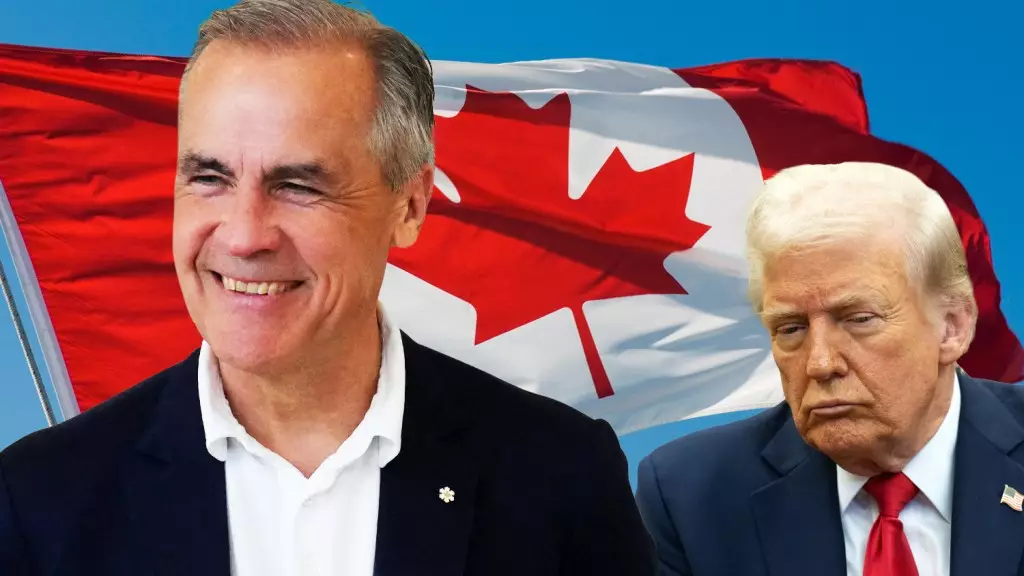In a remarkable twist of fate, the political landscape of Canada has undergone a refreshing revitalization, marked by the Liberal Party’s unexpected resurgence in the most recent election. Under the new leadership of Mark Carney, the Liberals secured a minority government, defying odds that had initially seemed stacked against them. With a backdrop of immense uncertainty, marked by recent domestic turmoil and international pressures, Carney’s triumph signals not only political resilience but also a potential turning point in a country that has often found itself in the shadows of larger global narratives.
The profound implications of this electoral outcome reverberate beyond mere numbers. Carney’s leadership has injected a fresh vigor into a party that once appeared to be on the verge of vaporization, as public opinion firmly sided with the Conservatives and their leader, Pierre Poilievre. What truly sets this election apart is the poignant dichotomy presented by current events, including a recent tragedy in Vancouver that saw the loss of 11 lives in a brutal attack. Such somber realities underscore not only the fragility of public sentiment but also the need for strong, unifying leadership in turbulent times.
The Tariff Tug-of-War
At the core of this election’s narrative lies a ferocious resistance to Donald Trump’s provocative tariffs and policies, which had ramped up nationalistic fervor among Canadians. Carney’s approach, characterized by determined rhetoric and a vision for a resilient Canadian economy, resonated particularly with a populace fatigued by the uncertainty that beset them under previous administrations. The Liberals’ campaign was imbued with a spirit of defiance against external pressures, showcasing a commitment to safeguarding Canadian values and interests.
As the election results poured in, it became evident that the Liberal Party’s message was successfully conveyed, reversing the earlier trend that positioned the Conservatives ahead by substantial margins. Many observers note that the dynamics shifted dramatically in light of Carney’s strategic mobilization of cultural icons like Mike Myers and Neil Young, who rallied behind the slogan “Canada Is Not For Sale.” This campaign direction cultivated a sense of national pride and solidarity, catalyzing a pivotal moment for the Liberal Party that once appeared to be faltering.
The Rise of the Two-Party System
The results of this election starkly illustrated a rare phenomenon: the decimation of smaller parties in the Canadian political arena, leading to an increasingly pronounced two-party system. With the Liberals garnering 147 seats while the Conservatives followed with 104, the political battlefield is shaping up as a showdown between these two titans. This shift not only simplifies electoral dynamics but also raises questions about the future representation of diverse voices within Canadian politics.
It’s ironic that as smaller parties saw their influence wane, the Liberals and Conservatives leaned into a singular issue that defined the electoral landscape: the manipulation of their sovereignty by a foreign president. The focus on economic security juxtaposed against Trump’s whims amplified the stakes of the election, ultimately rallying voters around a sense of protectionism. Carney’s foresight and messaging resonated strongly in populated areas such as Ontario and Quebec, where dissent against Trump’s threats was notably palpable.
Election Day Anomalies and Their Aftermath
However, the election was not without its challenges. Voter engagement encountered significant hurdles as the Elections Canada website experienced technical difficulties, delaying the release of results. Such disruptions are particularly concerning in a rapidly digitizing society where access to information is taken for granted. This incident stirred skepticism among voters and analysts alike, raising reiterative concerns about the integrity and efficiency of electoral processes in Canada.
As the dust settles, analysts and commentators will undoubtedly scrutinize the implications of the Liberals’ victory and the political tactics that led to such a significant turnaround. For many Canadians, the election represents not just a routine political cycle but a vital moment of reaffirmation of their identities and autonomy amidst complex global interdependencies. Mark Carney’s ascent to power promises not just a continuation of Liberal policies but an imaginative vision for Canada’s future, capable of navigating the vicissitudes of modern governance while cultivating a robust national character.

